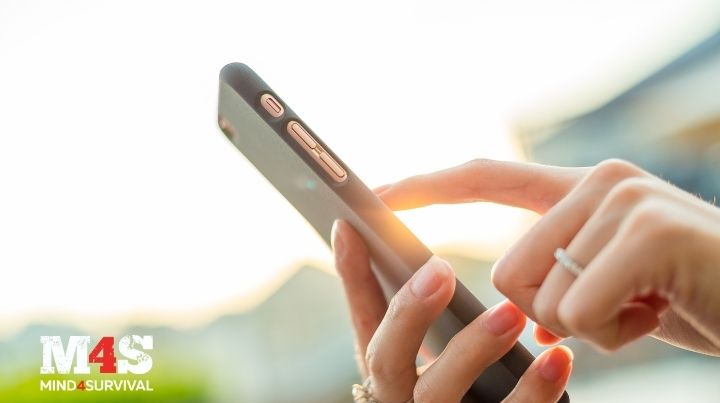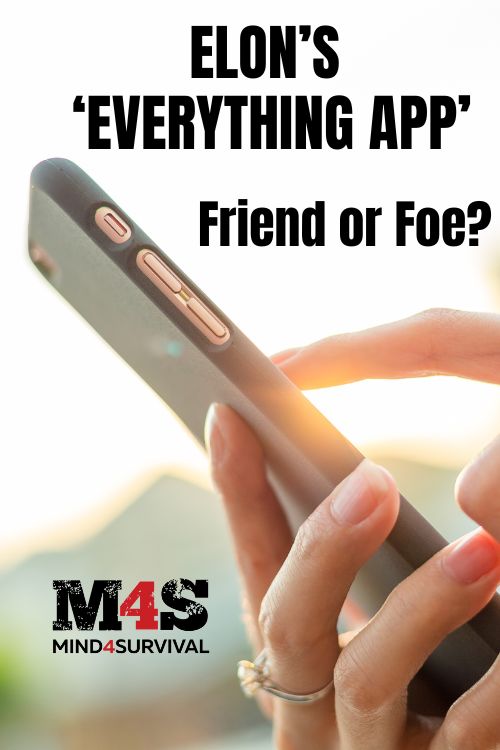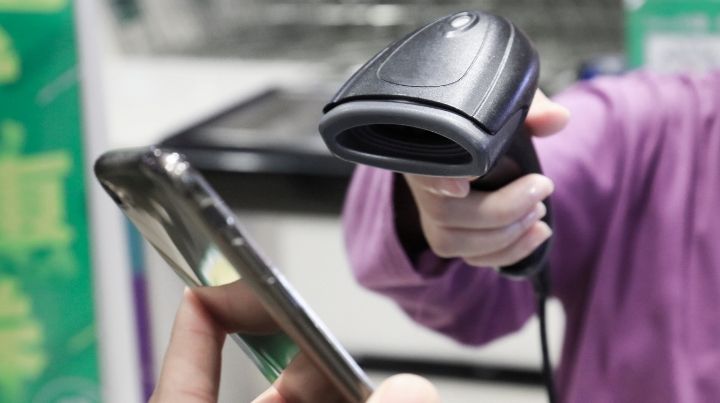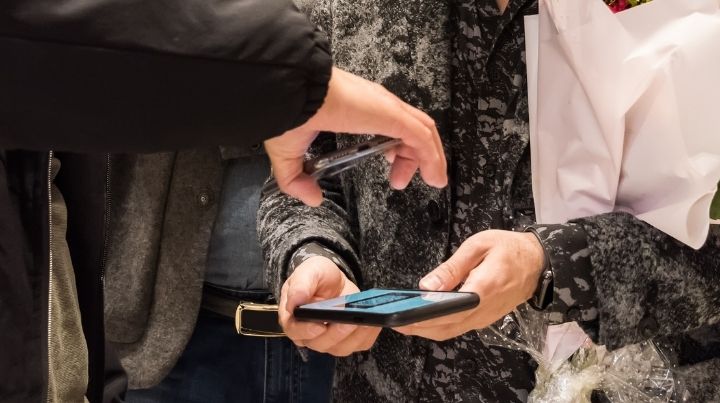Elon’s ‘Everything App’: Friend or Foe?

By now, we’ve all noticed that Twitter changed its name to X. But do you know why Elon made the change? He bought Twitter intending to turn it into the American “everything app,” Now that he’s moving forward with this plan, he felt like changing the name would reflect the changing nature of X.
Within the past few weeks, Musk has said that the next big steps will be to add voice and video calls and to broaden its biometric data collection. Elon says, “In the months to come, we will add comprehensive communications and the ability to conduct your entire financial world” (Source)
What’s the Everything App?
An everything app, or super app, combines multiple features onto one platform. China’s WeChat, for example, began as a messaging app but is now a way to do everything from banking to ordering food to reserving hotel rooms. 92% of Chinese consumers use digital wallets from WeChat or Alipay (another super app) as their primary payment method. In 2022, ITC Ltd launched MAARS, an app aimed at Indian farmers. ITC hopes its super app will help Indian farmers plan their crops, perform soil tests, identify pests and diseases, and market their wares. ITC also hopes the new app will streamline the loan process.
Super apps can be used across borders, too. For example, Singapore’s Grab app is used in Singapore, Indonesia, Malaysia, Thailand, Philippines, Vietnam, Cambodia, and Myanmar. This app started as a cab-hailing service and then branched into food delivery, groceries, and banking.
Ukrainians use their Diia app to file taxes, bank, and report the locations of Russian troops. Super apps are big, comprehensive, and can be tailored to meet the needs of specific populations.
Why Are They Popular?
Elon Musk has openly admired WeChat for years. “If you’re in China, you kind of live on WeChat,” Musk said in a 2022 interview. “It does everything. It’s sort of like Twitter plus PayPal plus a whole bunch of things all rolled into one, with a great interface. It’s really an excellent app, and we don’t have anything like that outside of China,” (Source)
Super apps generate revenue by collecting commission fees from service providers. For example, if you order food through a super app, the vendor has to pay a small fee to the app to make that connection with the customer. They also collect fees through financial transactions conducted on their platform or through stock or crypto trading. And then they collect advertising revenue, too.
Individuals like super apps because they’re convenient. Businesses like them because the huge platforms can advertise more effectively.
However, much of the super app’s popularity throughout Asia has to do with conventions in internet usage and banking. When Blackberry hit the market in 2000, 52% of Americans were already online. However, less than 2% of Chinese were internet users. By the end of 2010, Chinese internet usage hit 450 million, representing only about one-third of the country’s population. When WeChat hit the internet world in 2011, there was still a colossal amount of room to expand.
In some ways, the banking situation in Asia is similar. In 2021, 81% of American adults were fully banked. However, only about 62% of the population in Southeast Asia can say the same. India’s population is 77% banked, but Indonesia is only about 50% banked, while the Philippines, Laos, Burma, and Cambodia all have less than half their population fully banked. Like the Chinese and the internet ten years ago, there is still a massive amount of growth available to Southeast Asians regarding financial services, and smartphones have made banking cheaper and more accessible for this largely unbanked population than it would have been otherwise.
Similarly, credit card processing requires specific equipment. In the States, credit cards long predated smartphones. Most of us are used to them, and retailers have built that into their pricing mechanisms for decades. Smartphones, however, have largely made them redundant. For people in the Philippines or Indonesia who never had a credit card, and for vendors in those countries who never had processing machinery, why bother? The smartphone lets you do everything now.
Potential Disadvantages
However, super apps have some distinct disadvantages. One is feature overload, which happens when an app’s interface feels crowded. Speeds then may be reduced, too, making the apps less convenient.
Because super apps contain more lines of code, they have inherently more susceptibilities to hackers. Because they link so many different kinds of personal data, hacks are that much more catastrophic.
And super apps can be used as a tool for political repression. Remember when GoFundMe withheld payments for people involved with Canada’s Freedom Convoy? Imagine having all your funds in all your bank accounts frozen. With a super app, that will be a lot easier.
That instance was not a fluke, and political repression is not only directed at right-wingers. Within the past few weeks, the left-leaning website Grayzone had contributions to a recent fundraiser frozen to the tune of $90,000. And GoFundMe didn’t even really try to justify its actions; they just told GrayZone they had “some external concerns.”
Concentrating all your financial data and transaction history in one place should concern people of any political stripe who cherish their ability to hold dissenting views.
Geofencing
Consider what could happen, too, with geofencing. As described in a Wired investigation, law enforcement can sweep anonymous phone data to determine who was in a particular area during a criminal activity. They can then ask Google for additional information about any devices with suspicious movement. If investigators find highly suspicious movement, they can go to Google for specific user information.
Usually, these kinds of geofencing warrants pick up one or two suspects. For the Jan. 6 riots, however, law enforcement scooped up a massive amount of data, which was eventually used to charge dozens of protesters.
Now imagine if you happened to be near a crime scene, and law enforcement could not only track your movement but also shut down the bank accounts of everyone in the same area. Again, having all your finances and personal information on one device makes this much easier.
Super apps represent a concentration of information and power that is just not necessary for many of us.
Will the U.S. Get On Board?
If the market is left to its own devices, probably not. Much of WeChat’s success in China was due to timing. Someone was poised to snatch up an enormous market share; it happened to be WeChat.
WeChat was also assisted by the Chinese government banning most other major platforms, such as Facebook, Google, and Amazon. WeChat simply didn’t have international competition.
The CCP continues to support WeChat; in fact, this year, they openly bought shares in the company. The Chinese government recently forbade government employees from bringing iPhones into work, further reducing competition for the super app.
And Asia’s super apps are simply not bound by many of the antitrust regulations and privacy concerns Western companies have to deal with. Amnesty International gave WeChat a score of 0 out of 100 on the transparency index. That would be totally unacceptable in Western markets, but Asian cultures have different priorities.
Internet culture development in the U.S. was far more gradual. In the States, most of us were using desktops in the 90s. My friends and I were on AOL Instant Messenger years before smartphones were even on the market. People got used to their favorite apps as they developed; there was no massive rush of people using the internet through a smartphone for the first time.
Musk’s desire for a super app isn’t surprising; besides convenience, they are incredibly profitable. If someone could get Americans onto an equivalent of WeChat, they would rake in an enormous amount of money. But that would require changing decades of consumer behavior patterns, which isn’t likely.
Elon Musk is not the first person trying to get Americans onto a super app. Sam Bankman-Fried attempted (and failed) to turn FTX into an “everything app”. Facebook has also tried and failed. While hugely popular for social networking, their apps for college living, shopping, its Nextdoor copycat, and its video speed-dating service all shut down in 2022.
Final Thoughts
We’ll see if Elon can convince Americans to hop on board with his goals for X. There’s nothing wrong with him trying.
If he starts getting any kind of assistance from the government, however, I think it would be time to be concerned. Super apps have made logical sense in Asia. Here, they don’t. If one app starts becoming heavily promoted, it will likely have less to do with market forces and more to do with streamlining the ability to access the general public’s personal information, including our biometric data, as Elon mentioned above.
I think this is worth paying attention to. Most of us use smartphones all the time; we need to pay attention to who has our data. Personally, I am more comfortable with it not all being in one place, but we’ll see how the general public feels in the months to come.
Additional Resources:
- CRISPR Technology: What Preppers Need to Know
- Solar Modification: Why They’re Coming for Our Sunshine
- Reducing Surveillance Signatures: Begin with the Cell Phone
- How Do Phone Scams Work? Avoid Becoming a Victim

Don't Miss Out!
Join the thousands of people who rely on Mind4Survival preparedness advice by subscribing to our FREE newsletter.
- Practical preparedness information
- Zero Spam
- < 0.25% of people unsubscribe




Join Mind4Survival!
Stay informed by joining the Mind4Survival! 100% Secure! 0% Spam!
Follow Us!
Affiliate Disclosure
Mind4Survival is a free, reader-supported information resource. If you make a purchase through our link, we may, at no cost to you, receive an affiliate commission.




A superapp? From Elon? No way